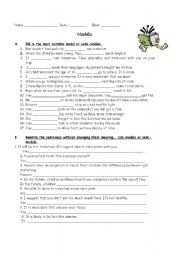


Like modal verbs, it doesn't ever change forms or use another helping verb. Publication or redistribution of any part of this document is forbidden without authorization of the copyright. I also inserted Teacher´s notes from Oxford. It is intended to help whenever stds have doubts. " Ought to" has tendencies of both modal verbs and semi-modal verbs. MODALS, MARGINAL or SEMI-MODALS, SEMI AUXILIARIES STUDY CHART worksheet.You will be given several sentences with blank spaces. Also, with be as a helping verb, used to gives the idea of being accustomed to doing the action of the main verb. In this exercise, you will practice conjugating these common German modal verbs in the present tense. b A modal is always used with a verb in its basic form. Used to conveys the idea that an action happened habitually in the past, but no longer occurs. The most commonly used modals are shall, should, will, would, can, could, may.Dare is often also used in formal questions. It is more often used in formal negative sentences, and more often in British English. Dare shows that the subject is making a conscious effort, or has great desire to do the action of the main verb.In formal negative constructions, need is often used without "to" before the main verb. I have studied a lot trying to internalize all its uses and understand when is appropriate or not to use one particular modal or another but I still have some problems with some of them. Need communicates necessity or obligation. Modals and Semi-Modals Verbs Comment: For me, Modals and Semi-modals have always been one of the most difficult and challenging grammatical topics.Remember, that with semi-modals, "to" is part of the verb phrase. They are different from modal verbs, though, because they behave more like typical verbs - for example, they change to agree with their subjects, they change tense, and they can be combined with other helping verbs like be, have. The main verb that follows a semi-modal verb is always the "bare infinitive form" - the basic verb form. Semi-Modal Verbs function in much the same way as modal verbs - they are an auxiliary verb that adds information to the main verb, but can't really function alone.They are different from modal verbs, though, because they behave more like typical verbs - for example, they change to agree with their subjects, they change tense, and they can be combined with other helping verbs like be, have, and do.Semi-Modal Verbs function in much the same way as modal verbs - they are an auxiliary verb that adds information to the main verb, but can't really function alone.Whenever it rang, he _ (always, yell), “I’m not here!” Usually, he was only joking and _(come) to the phone when it was for him. My father never liked to talk on the phone. But he _ read or write because he never went to school.Ģ0. I _ get to sleep last night because it was too hot in my room.ġ9. Why _ all the nations of the world just get along in peace? Why are there always wars somewhere on the earth?ġ8. I _ swim long distances when I was a teenager.ġ7. Ellen is having a lot of trouble in her chemistry class. B: I think he _ join some clubs to meet people with similar interests.ġ3. I have some work I _ finish before I go to bed tonight.ġ2. External link to: Dare as a semi-modal verb Topic. It means to challenge someone to do something he/she is afraid of doing or to have the courage to do something. Thank goodness we _ eat fish again tonight. The verb dare is both a main verb and a semi-modal verb. If you have an aquarium, you _ give your tropical fish too much food or they’ll die.ĩ. They sometimes behave like modal verbs and do not add -s to the form that goes with he, she, and it. To stay alive, people _ breathe oxygen.Ĩ. Because of this, they are called semi-modals. _ you give me some advice about buying a better one?ĥ. _ you please read it over for spelling errors?ģ. I wrote this paper for my literature class last night. (can, would, may, could, should, had better, must, have to, can’t, couldn’t, mustn’t, don’t have to)ġ. Notice that in some cases more than one modal may be used. (may)Ĭomplete the following sentences with correct modal (or semi-modal) auxiliaries taken from the list given below. You must try hard solving modal auxiliary & semi auxiliary verbs exercises.Professor Villa, we’ve finished our work for today. They _ have a blood test before they get married.ġ1.


 0 kommentar(er)
0 kommentar(er)
